Strictly Personal
Who Is Dividing The North? By Lasisi Olagunju
Published
2 years agoon

Speaking at a book launch in Kaduna Thursday last week, Prof Ango Abdullahi, leader of the Northern Elders Forum (NEF), accused some unnamed persons of engaging in destructive campaigns to destroy the north. “I have to state here that we are witnessing some of the crudest and most unproductive campaigns to create divisions between Hausa and Fulani people, and create distances between Christians and Muslims in the north,” he said, and promised that “these contemptible attempts will fail.” He hinged his optimism of victory on what he called the campaigns’ lack of “support in history going back centuries, or in the recent past.” The north, he said, may differ in faith and ethnicity, but “history, geography and our experiences in living as Nigerians have created roots and bonds that cannot be destroyed by desperate political gambits.”
Do not dismiss Ango Abdullahi’s cries; he has his reasons. For many in the north, W.H. Auden’s ‘Funeral Blues’ is their day’s opening and closing glee: There, clocks have stopped ticking; pianos are silenced, drums muffled; there is at least a mourner in every home. The public doves of the north are in black; rural terror and urban bandits have put out the stars; they have poured away the ocean, packed up the moon, and dismantled the sun. Whether Muslim or Christian, farmer or herder, Thomas Gray’s ‘Elegy’ tolls the knell of their toil. It is their song of dispraise. The owl has been long out unchallenged; birds of death fade the glitter of their landscape; they brown the greenery. It is ghastly, the people are tired but the end is not yet.
A silent debate is going on in Hausa/Fulani northern Nigeria. It is challenging a status quo that has dominated lives and living in that corridor for almost 220 years. Ango Abdullahi’s screech flowed from this reality; it was timely and his fears real but the etiology he ticked and the prognosis he chose are very wrong. He did not mention names but his choice of words suggests his oracle sees southern politicians holding long knives and seeking to divide the north to win the coming presidential election. The oracle is wrong. The death of the kola nut is right inside its lobes, not anywhere else. The Fulani north fed the tiger’s tail to their dog, should they now wonder why the big cat is on the prowl? The Hausa are seen in television documentaries accusing the Fulani of ruining their farming lives; the Fulani are seen boasting and accusing the Hausa of destroying their nomadic existence; the federal government of the north wines away in ethnic insouciance.
Ango Abdullahi thinks “desperate political gambits” from outside the north are behind the ethnic and religious rumblings in the north. If you are close to him, tell him to ask the marabouts of Maradi why the scales are falling from the eyes of the oppressed and why the ancestral falcon no longer listens to the call of the feudal falconer. If things are falling apart and the centre no longer holds, the discerning will lower his eyes to see the nose. William Butler Yeats’ lyrical poem, ‘The Second Coming may be a 1919 masterpiece, but it speaks to the 2022 realities of the poor north, the larceny of the elite, and the crocodile tears of the elders. Yeats’ muse tells him that history stammers and, with every stutter, every repetition, the gyre, the spiral, and the vortex widen. The northern privilege gapes at anarchy as it unfurls, stark naked; the poet sees the monster as it is “loosed upon the world.” But what is the antidote? None. The only message the prophet is given is that “some revelation is at hand.”
That ‘revelation’ is now. When the children of slaves start dancing ‘Buga’ and the feudal vassal is asking questions and demanding answers from the liege lord, then there is every reason for the men at the top to be afraid. That is what is happening between ethnic and religious groups in the north. It is the reason Ango Abdullahi spoke in Kaduna last Thursday. The central question that rankles there is: The Uthman dan Fodio Jihad of 1804 which overthrew the Hausa kings, was it driven truly by religious piety or by politics of ethnic supremacy and hegemony? There is a frantic effort to kill the question and defuse the bomb. Descendants of the displaced are talking about their paradise lost and it is not funny. They stalk the thrones; palace spies and guards also stalk them. Mallams and more Mallams are daily speaking out against rupturing the peace of their graveyard. The discourses are in Hausa language and it is a back-and-forth thing that ends up uploaded on Facebook. Fortunately, Facebook’s translation tool works near-wonders and I use it to follow comments and trends. Could those asking the subversive question be truly from the Muslim north or they are heathen ghosts wearing the fur skin of the faithful? Are they politicians outside the north seeking to profit from the autumn of a region at sea? From Ango Abdullahi’s charge and the videos of the Mallams that I watched, it appears that many in the conclave still live in denial of who the enemy is. The enemy is the victim – the north itself, not anyone else.
Who is dividing the north along ethnic and religious lines? The down people may lack eloquence, but they are not necessarily dumb. They nurse their peppered children and see children of the rich being pampered with pepper soup. A certain Bello Turji, Zamfara’s decorated bandit warlord, looked into a reporter’s camera and triumphantly announced that he had lost count of the number of people he had killed. The people he killed belonged to the other ethnic side and he said so with cavalier calmness. There is Ado Alero too, a numero uno bandit who also confessed on camera that he had killed as many as the sands of the desert. The state did not go for him; it went for the channel that made it possible for us to hear him. Then we heard that the confessed killer would be given a chieftaincy title. Everyone, including his victims, said, no, it was not possible. But he was, indeed, so turbaned in broad daylight; and nothing happened. Nothing happened to the two kingpins except that the state government announced that Turji, the mass murderer, had become their partner in fighting killers.
There was a lady called Deborah Samuel who was murdered and her corpse burnt at noon in her Sokoto school compound. She was a northerner; her killers were northerners too. The murderers were not seen wearing masks; they video-recorded themselves celebrating their chilling feat. They showed no fear because they were goats of the king; they could eat any yam in any barn. And it is logical; you do not have the king and have fears. Where are the killers of that lady? They are not in jail; they are not in court; they are in freedom. Their victim is buried deep somewhere in an unmarked grave; her parents and siblings are displaced to the south. The police announced last week that they were still looking for her killers. What would the victims say other than that the north’s official flies are taking sides with their ethnic sore?
So, who is dividing the north? Those dividing the north are the religious scholars who approve of murders and teach terror to the young. A 37-year-old Jigawa singer, Mukaila Ahmadu, last week used a pestle to kill his father, then his mother, because of religion. He had no regrets and he told the world so with defiance that was out of this world. The enemy is the ideology that inspired that man to run mad. The enemy is the religious school that is inspiring a million others to kill and maim.
Ango Abdullahi also spoke about history. The history I read does not support his optimism. He should go back and read the history of his north: war, subjugation, poverty. Those are the keywords and they appear in every chapter.
We should be involved in preventing a bigger explosion in the Muslim north – bigger than what we’ve seen so far. The first time there was a convulsion there (1804-1808), everywhere else in most of Africa lost their peace. The Uthman dan Fodio jihad ruptured clan and family ties across swaths of land beyond what history could ever record. Historians say the ripples of the jihad “stretched 1,500 kilometers from Dori in modern Burkina Faso to southern Adamawa in Cameroon and included Nupe land, Ilorin in northern Yorubaland, and much of the Benue River valley.” They add that from the savannah to the Red Sea, the Fulani war of faith altered the course of history while “providing inspiration for a series of related holy wars in today’s Senegal, Mali, Ivory Coast, Chad, Central African Republic, and Sudan.” Yorubaland, where I come from, owes its first era of political convulsions and bitter divisions and recriminations, directly and indirectly, to that epoch. It created enemies at home and foes abroad. It constructed the alleys of slavery and slave trade for those described by Ghanaian writer, Ayi Kwei Armah, as Arab predators and European destroyers. It produced an era when it was pure suicide for an Ijesa to be seen in front of Bashorun Ogunmola’s compound in Ibadan; it was also self-murder, at that time, for an Ibadan person to be caught passing by the homestead of Sodeeke in Abeokuta. But that era is long gone in Yorubaland. It would not have gone if the leaders had done what today’s northern ostriches do, burying their heads in the sand while injustice reigns across their land.
The bandits of the north filed out mainly from one ethnic hole. They have reportedly been joined by ISWAP terrorists. Their victims are of other ethnicities. Yet, both sides have been around each other like two friendly rivers, herding, and farming, for hundreds of years. And both poles are mainly Muslim and you ask why the war? This is not the first time that that question has been asked. The question came up in 1805 when dan Fodio’s jihad attacked Kanem-Bornu (present Lake Chad area) and was decisively repelled. The Muslim inhabitants of the attacked area were shocked that their supposed brothers-in-faith were killing them and destroying their lives. In a series of letters written by an Islamic scholar, Muhammad al-Amin ibn Muhammad al-Kanami (El-Kanemi) “to the Fulani ulama and their chiefs,” the jihadists’ religious mission and credentials were thoroughly questioned. He accused dan Fodio of killing fellow Muslims in pursuit of land, gold, and glory. The other side also replied giving reasons for their campaigns. Some historians are certain of nine such letters: One from El-Kanemi to dan Fodio; two from dan Fodio to El-Kanemi; one from El-Kanemi to dan Fodio’s son and successor, Mohammed Bello, and five from Bello to El-Kanemi. The central issue in all the letters is why the dan Fodio people believed they were more qualified than others to define who a Muslim was, who deserved to die, and who should be enslaved. I quote from El-Kanemi’s first letter to dan Fodio:
“The reason for writing this letter is that when fate brought me to this country, I found the fire which was blazing between you and the people of the land. I asked the reason, and it was given as injustice by some and religion by others. So, according to our decision in the matter, I wrote to those of your brothers who live near to us asking them the reason and instigation of their aggression, and they returned me a weak answer, not such as comes from an intelligent man, much less from a learned person, let alone a reformer. They listed the names of books, and we examined some of them, but we did not understand from them the things which they apparently understood. Then, while we were still perplexed, some of them attacked our capital, and the neighbouring Fulani came and camped near us. So, we wrote to them a second time beseeching them in the name of God and Islam to desist from their evil doing. But they refused and attacked us. So, when our land was thus confined and we found no place even to dwell in, we rose in defense of ourselves, praying to God to deliver us from the evil of their deeds, and we did what we did. Then when we found some respite, we desisted, and for the future, God is all-knowing….Tell us, therefore, why you are fighting us and enslaving our free people. If you say that you have done this to us because of our paganism, and it is far from our compound. If praying and the giving of alms, knowledge of God, fasting in Ramadan and the building of mosques is paganism, (then) what is Islam?….”
You may like
-


Nigerian govt shuts Chinese supermarket over ‘no-Nigerian shopper’ allegation
-
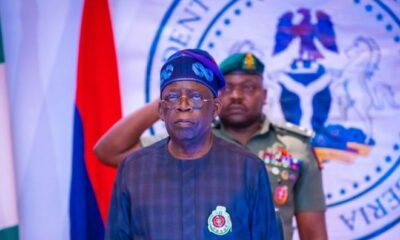

Nigeria: President Tinubu identifies illegal mining as source of terrorism financing
-


Nigeria wants $2.25 billion World Bank loan
-


Nigeria’s Access Bank says its N365bn capital raise to be fully digital
-
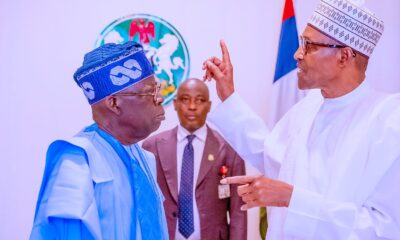

Nigeria: Unlike Buhari, Tinubu’s govt has not borrowed from the central bank— Finance Minister
-


Yoruba secessionist group seeks exit from Nigeria, writes open letter to Tinubu
Strictly Personal
Air Peace, capitalism and national interest, By Dakuku Peterside
Published
7 days agoon
April 16, 2024
Nigerian corporate influence and that of the West continue to collide. The rationale is straightforward: whereas corporate activity in Europe and America is part of their larger local and foreign policy engagement, privately owned enterprises in Nigeria or commercial interests are not part of Nigeria’s foreign policy ecosystem, neither is there a strong culture of government support for privately owned enterprises’ expansion locally and internationally.
The relationship between Nigerian businesses and foreign policy is important to the national interest. When backing domestic Nigerian companies to compete on a worldwide scale, the government should see it as a lever to drive foreign policy, and national strategic interest, promote trade, enhance national security considerations, and minimize distortion in the domestic market as the foreign airlines were doing, boost GDP, create employment opportunities, and optimize corporate returns for the firms.
Admitted nations do not always interfere directly in their companies’ business and commercial dealings, and there are always exceptions. I can cite two areas of exception: military sales by companies because of their strategic implications and are, therefore, part of foreign and diplomatic policy and processes. The second is where the products or routes of a company have implications for foreign policy. Air Peace falls into the second category in the Lagos – London route.
Two events demonstrate an emerging trend that, if not checked, will disincentivize Nigerian firms from competing in the global marketplace. There are other notable examples, but I am using these two examples because they are very recent and ongoing, and they are typological representations of the need for Nigerian government backing and support for local companies that are playing in a very competitive international market dominated by big foreign companies whose governments are using all forms of foreign policies and diplomacy to support and sustain.
The first is Air Peace. It is the only Nigerian-owned aviation company playing globally and checkmating the dominance of foreign airlines. The most recent advance is the commencement of flights on the Lagos – London route. In Nigeria, foreign airlines are well-established and accustomed to a lack of rivalry, yet a free-market economy depends on the existence of competition. Nigeria has significantly larger airline profits per passenger than other comparable African nations. Insufficient competition has resulted in high ticket costs and poor service quality. It is precisely this jinx that Air Peace is attempting to break.
On March 30, 2024, Air Peace reciprocated the lopsided Bilateral Air Service Agreement, BASA, between Nigeria and the United Kingdom when the local airline began direct flight operations from Lagos to Gatwick Airport in London. This elicited several reactions from foreign airlines backed by their various sovereigns because of their strategic interest. A critical response is the commencement of a price war. Before the Air Peace entry, the price of international flight tickets on the Lagos-London route had soared to as much as N3.5 million for the economy ticket. However, after Air Peace introduced a return economy class ticket priced at N1.2 million, foreign carriers like British Airways, Virgin Atlantic, and Qatar Airways reduced their fares significantly to remain competitive.
In a price war, there is little the government can do. In an open-market competitive situation such as this, our government must not act in a manner that suggests it is antagonistic to foreign players and competitors. There must be an appearance of a level playing field. However, government owes Air Peace protection against foreign competitors backed by their home governments. This is in the overall interest of the Nigerian consumer of goods and services. Competition history in the airspace works where the Consumer Protection Authority in the host country is active. This is almost absent in Nigeria and it is a reason why foreign airlines have been arbitrary in pricing their tickets. Nigerian consumers are often at the mercy of these foreign firms who lack any vista of patriotism and are more inclined to protect the national interest of their governments and countries.
It would not be too much to expect Nigerian companies playing globally to benefit from the protection of the Nigerian government to limit influence peddling by foreign-owned companies. The success of Air Peace should enable a more competitive and sustainable market, allowing domestic players to grow their network and propel Nigeria to the forefront of international aviation.
The second is Proforce, a Nigerian-owned military hardware manufacturing firm active in Rwanda, Chad, Mali, Ghana, Niger, Burkina Faso, and South Sudan. Despite the growing capacity of Proforce in military hardware manufacturing, Nigeria entered two lopsided arrangements with two UAE firms to supply military equipment worth billions of dollars , respectively. Both deals are backed by the UAE government but executed by UAE firms.
These deals on a more extensive web are not unconnected with UAE’s national strategic interest. In pursuit of its strategic national interest, India is pushing Indian firms to supply military equipment to Nigeria. The Nigerian defence equipment market has seen weaker indigenous competitors driven out due to the combination of local manufacturers’ lack of competitive capacity and government patronage of Asian, European, and US firms in the defence equipment manufacturing sector. This is a misnomer and needs to be corrected.
Not only should our government be the primary customer of this firm if its products meet international standards, but it should also support and protect it from the harsh competitive realities of a challenging but strategic market directly linked to our national military procurement ecosystem. The ability to produce military hardware locally is significant to our defence strategy.
This firm and similar companies playing in this strategic defence area must be considered strategic and have a considerable place in Nigeria’s foreign policy calculations. Protecting Nigeria’s interests is the primary reason for our engagement in global diplomacy. The government must deliberately balance national interest with capacity and competence in military hardware purchases. It will not be too much to ask these foreign firms to partner with local companies so we can embed the technology transfer advantages.
Our government must create an environment that enables our local companies to compete globally and ply their trades in various countries. It should be part of the government’s overall economic, strategic growth agenda to identify areas or sectors in which Nigerian companies have a competitive advantage, especially in the sub-region and across Africa and support the companies in these sectors to advance and grow to dominate in the African region with a view to competing globally. Government support in the form of incentives such as competitive grants ,tax credit for consumers ,low-interest capital, patronage, G2G business, operational support, and diplomatic lobbying, amongst others, will alter the competitive landscape. Governments and key government agencies in the west retain the services of lobbying firms in pursuit of its strategic interest.
Nigerian firms’ competitiveness on a global scale can only be enhanced by the support of the Nigerian government. Foreign policy interests should be a key driver of Nigerian trade agreements. How does the Nigerian government support private companies to grow and compete globally? Is it intentionally mapping out growth areas and creating opportunities for Nigerian firms to maximize their potential? Is the government at the domestic level removing bottlenecks and impediments to private company growth, allowing a level playing field for these companies to compete with international companies?
Why is the government patronising foreign firms against local firms if their products are of similar value? Why are Nigerian consumers left to the hands of international companies in some sectors without the government actively supporting the growth of local firms to compete in those sectors? These questions merit honest answers. Nigerian national interest must be the driving factor for our foreign policies, which must cover the private sector, just as is the case with most developed countries. The new global capitalism is not a product of accident or chance; the government has choreographed and shaped it by using foreign policies to support and protect local firms competing globally. Nigeria must learn to do the same to build a strong economy with more jobs.
Strictly Personal
This is chaos, not governance, and we must stop it, By Tee Ngugi
Published
2 weeks agoon
April 10, 2024
The following are stories that have dominated mainstream media in recent times. Fake fertiliser and attempts by powerful politicians to kill the story. A nation of bribes, government ministries and corporations where the vice is so routine that it has the semblance of policy. Irregular spending of billions in Nairobi County.
Billions are spent in all countries on domestic and foreign travel. Grabbing of land belonging to state corporations, was a scam reminiscent of the Kanu era when even public toilets would be grabbed. Crisis in the health and education sectors.
Tribalism in hiring for state jobs. Return of construction in riparian lands and natural waterways. Relocation of major businesses because of high cost of power and heavy taxation. A tax regime that is so punitive, it squeezes life out of small businesses. Etc, ad nauseam.
To be fair, these stories of thievery, mismanagement, negligence, incompetence and greed have been present in all administrations since independence.
However, instead of the cynically-named “mama mboga” government reversing this gradual slide towards state failure, it is fuelling it.
Alternately, it’s campaigning for 2027 or gallivanting all over the world, evoking the legend of Emperor Nero playing the violin as Rome burned.
A government is run based on strict adherence to policies and laws. It appoints the most competent personnel, irrespective of tribe, to run efficient departments which have clear-cut goals.
It aligns education to its national vision. Its strategies to achieve food security should be driven by the best brains and guided by innovative policies. It enacts policies that attract investment and incentivize building of businesses. It treats any kind of thievery or negligence as sabotage.
Government is not a political party. Government officials should have nothing to do with political party matters. They should be so engaged in their government duties that they literally would not have time for party issues. Government jobs should not be used to reward girlfriends and cronies.
Government is exhausting work undertaken because of a passion to transform lives, not for the trappings of power. Government is not endless campaigning to win the next election. To his credit, Mwai Kibaki left party matters alone until he had to run for re-election.
We have corrupted the meaning of government. We have parliamentarians beholden to their tribes, not to ideas.
We have incompetent and corrupt judges. We have a civil service where you bribe to be served. Police take bribes to allow death traps on our roads. We have urban planners who plan nothing except how to line their pockets. We have regulatory agencies that regulate nothing, including the intake of their fat stomachs.
We have advisers who advise on which tenders should go to whom. There is no central organising ethos at the heart of government. There is no sense of national purpose. We have flurries of national activities, policies, legislation, appointments which don’t lead to meaningful growth. We just run on the same spot.
Tee Ngugi is a Nairobi-based political commentator
EDITOR’S PICK


Educationist challenges media freedom norms, cautions against misuse of freedom of expression
Geshom Banda, Deputy Head Teacher at Hillside Primary School, presents a contrasting perspective amidst discussions on media freedom and digital...


Nigerian govt shuts Chinese supermarket over ‘no-Nigerian shopper’ allegation
Nigeria’s Federal Competition and Consumer Protection Commission has shut down a Chinese store in Abuja, the country’s capital, because it...


Nigeria: President Tinubu identifies illegal mining as source of terrorism financing
Nigeria’s President Bola Tinubu has identified illegal mining activities as a major source of terrorism financing in the country and...


Nigeria wants $2.25 billion World Bank loan
Nigeria’s Finance Minister, Wale Edun, has revealed that the country is seeking up to $2.25 billion in World Bank loans...
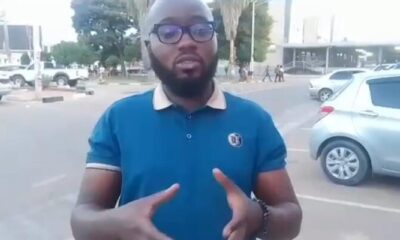

‘Complex, contentious,’ media enthusiast says media rights often depend on goodwill of political leadership (video)
Kitwe Press Club spokesperson, Michael Kaluba, has described the media landscape in Zambia as complex and contentious. In a conversation...


UN signs MoU with Kenya’s Konza Technopolis
The United Nations has signed a Memorandum of Understanding (MoU) with Kenya’s Konza Technopolis that will provide a wide range...


Ghana mourns as top gospel music icon Koda passes away
The Ghanaian entertainment industry has, once again, been thrown into mourning following the death of renowned gospel musician, Kofi Owusu...


South African club admits they can’t keep Nwabali
Chairman of South African club side, Chippa United, Siviwe ‘Chippa’ Mpengesi, has given up on retaining the services of Super...


Chinsali youth advocates broadening of access to information to impact rural areas
Joseph Mulenga, a 24-year-old carpenter from Chinsali District in Muchinga Province, has spoken on the necessity of broadening access to...
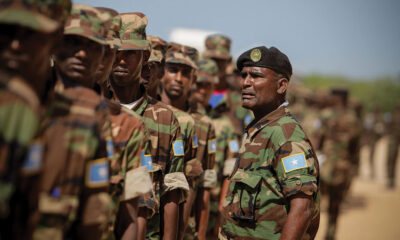

African leaders seek change in fight against terrorism at Nigerian summit
At a security summit in Nigeria, African leaders have called for a revamp of institutions that fight violent extremism on...
Trending
-
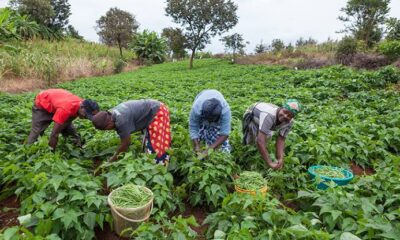
 Tech2 days ago
Tech2 days agoKenya’s agri-tech startup Pula raises $20m funding for farmers’ insurance
-

 Sports2 days ago
Sports2 days agoKenya’s Peres Jepchirchir fulfils promise of breaking world record at London Marathon
-

 VenturesNow2 days ago
VenturesNow2 days agoNigeria: Unlike Buhari, Tinubu’s govt has not borrowed from the central bank— Finance Minister
-
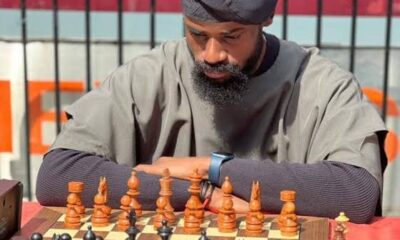
 Behind the News1 day ago
Behind the News1 day agoBehind the News: All the backstories to our major news this week


